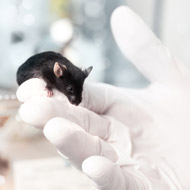Symposium explores animal welfare and research

The School of Clinical Sciences won first prize for developing a refined method for producing aortic aneurysms in mice.
The first Animal Welfare and Research '3Rs' symposium was held at the University of Bristol last month, giving scientists the chance to learn about current research and share good practice of the ‘3Rs’: Replace, Reduce and Refine.
Developed more than 50 years ago, the principles of the 3Rs are rooted in European and UK law. When researchers use animals, they must follow the ‘3Rs’ - aiming to replace them, where possible, with alternatives, reduce the number of animals used and to refine their experiments to reduce any adverse effects.
Dr Nicola Watts, director of services at the university, commented: “All our scientists who work with laboratory animals at the university are committed to the '3Rs' and events like this symposium enable the sharing of good practice.”
During the symposium, there were presentations about current research projects and a researcher poster session. The university also announced the winners of its first '3Rs' competition.
The School of Clinical Sciences won first prize for developing a refined method for producing aortic aneurysms in mice. An aortic aneurysm is a bulge in a section of the aorta which, if it ruptures, can cause sudden death. The researchers have also developed a new human aortic aneurysm model in the laboratory, which may replace the need for animal models.
Second prize went to the School of Physiology Pharmacology & Neuroscience, which has developed a method for giving oral drugs using solutions that mice and rats both like. The method, which includes solutions like milk and milkshake, avoids the need for restraint and reduces stress in the animals.
The School of Clinical Sciences also scooped the third prize for developing photographic techniques that can be used in conscious animals. The new technique has revolutionised pre-clinical eye research and cut the number of animals required.
“Animal research plays an essential role in advancing science and treating major health problems," explained Professor John Iredale, vice-chancellor for health at the university. "Despite the advances in non-animal methods, it is still essential to use animals where no viable alternatives exist."



 The Veterinary Medicines Directorate (VMD) is inviting applications from veterinary students to attend a one-week extramural studies (EMS) placement in July 2026.
The Veterinary Medicines Directorate (VMD) is inviting applications from veterinary students to attend a one-week extramural studies (EMS) placement in July 2026.